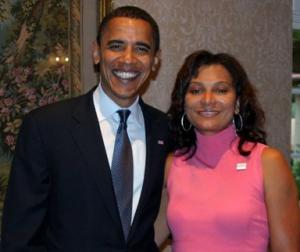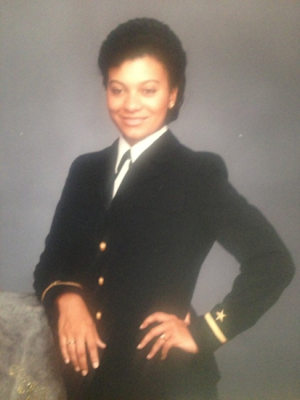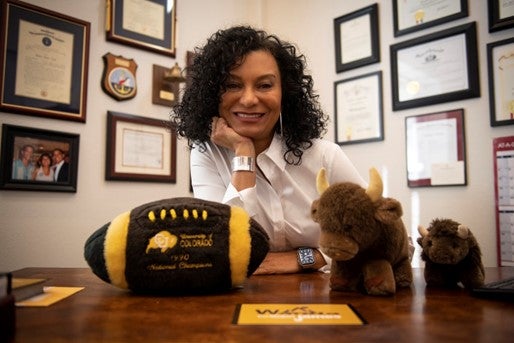Five questions for Wanda James
Wanda James in November became the first Black woman elected to the CU Board of Regents in over 44 years. The Denver Democrat represents Colorado’s 1st Congressional District.
James is a first-generation graduate of CU Boulder and the first Black woman commissioned through the Naval ROTC program. After serving four years in the military, she worked for two Fortune 100 companies and one of the largest senior living nonprofits in California. Her husband, Chef Scott Durrah, has opened five restaurants in Colorado and California. An entrepreneur in the cannabis industry, James considers herself an advocate for political equity, a social justice fighter and a lifelong learner.
“As the first African Americans legally licensed to own a dispensary in America, my husband and I have been at the forefront of creating an entire industry that evolved through systemic racism, corrupt law enforcement practices and slave labor,” James said. “Through this journey of 14 years, I have learned how to combat bias and misinformation not only in Colorado but nationally and internationally. While the issues in higher learning are not as severe as we have seen in cannabis, the practice of microaggressions against underrepresented groups is an American phenomenon. I look forward to having the opportunity to make sweeping changes in how we view progress.”

James managed the congressional campaign for now-Gov. Jared Polis; was appointed to National Finance Committees by former President Barack Obama, Vice President Kamala Harris and President Joe Biden; and was an appointed member of Gov. Polis’ transition team.

“I feel like I have been preparing for this role as a regent my entire life,” James said. “My work in politics has been a powerful example of what is possible when you decide to get involved.”
1. What first interested you in running for the Board of Regents?
I was having a conversation with a couple of former regents about the open seat in CD1 at Gov. Polis’ wedding. They were discussing that there has not been a Black woman on the board for 38 years. I agreed to help to come up with some names of women who would be willing to serve.
As I was thinking about names, I became motivated by a desire to serve my alma mater. I wanted to make a positive impact on education and student life and to advocate for policies that would ensure CU becomes more welcoming to more people. The idea of having the opportunity to influence decision-making within the university and to gain more experience in leadership and governance became very exciting to me. I passionately felt like my life experiences would translate into a meaningful role.
2. You went on to become the first Black woman elected to the board in over 44 years. What does it mean to you to have that distinction?
It is a significant achievement and a historic moment. It represents progress toward greater diversity and inclusion in leadership positions, as well as increased representation in decision-making roles.
My time on this board will also provide an opportunity to advocate for issues that disproportionately affect underrepresented communities, and to ensure that their perspectives and experiences are considered in our strategic planning. It is also my hope that this election serves as a source of inspiration for other Black women and girls who may have previously felt that such positions were unattainable or not accessible to them.
Overall, this milestone brings us a step forward in creating a more inclusive and diverse educational landscape. I am honored that the universe placed me here at this time in history. It is time for people of color to have a permanent seat at all tables of power at every level.
3. Having taken part in the recent winter retreat and this month’s first official meeting with the new board, is there anything about the University of Colorado you’ve learned that you didn’t know before?
It is all new to me. I am struck by the enormous job that is the University of Colorado system. Like all people of color that come into the university system, I was most struck by the lack of Black people in leadership. It was completely shocking to me that CU has no Black vice presidents. I intend to work closely with the university administration to increase the diversity in the pools of candidates for these kinds of leadership positions, as well as the diversity of individuals in the leadership pipelines. This is an issue. We cannot talk about diversity with the students if we have extremely limited or no diversity at the system level.
On a positive note, I am struck by how much of the Colorado economy the CU system influences. As the third-largest employer in the state, with a $5.5 billion budget, we are an integral part of the economy. That means we have the responsibility to include all people, from all walks of life. I am excited to be a megaphone and cheerleader to all the possibilities of great things we can accomplish, and all the great things we do accomplish every day. This is an amazing institution – one I am immensely proud of.
There are a lot of pressing issues I expect the board will be dealing with in the coming months. More than I ever imagined before taking the oath of office. Of course, many controversial issues will be front-page news such as the budget process and tuition increases. And the fun stuff like creating a winning, bowl-contending football team with our new celebrity coach.
The conversations I have enjoyed the most revolve around how we are going to meet the needs of a new student coming into our university. In a post-COVID world, there are new demands on education. We have to look at online learning, lifelong learning and access to new and emerging industries. I am thrilled to roll up our proverbial sleeves and discover all the great ways to bring education to as many students as possible.
4. You have described yourself as an advocate for political equity and social justice. How will you go about pursuing these goals as a board member?
To pursue political equity, a CU regent should work to ensure that all voices are heard and represented within the university system. This will involve advocating for policies that promote diversity and inclusion, such as hiring practices that prioritize underrepresented groups and creating safe spaces for marginalized communities.
To pursue social justice, a CU regent should work to address issues of inequality and discrimination within the university system and the wider community. This will involve advocating for policies that support marginalized communities, such as increasing financial aid for low-income students and promoting mental health services for all students.
Additionally, a CU regent should work to promote civic engagement and activism among students, faculty and staff, by creating opportunities for meaningful participation in the democratic process, such as registering voters and making their voices heard through organizing peaceful protests or demonstrations. The years spent on a university campus should be a time of finding your voice and expressing your power.
Ultimately, pursuing political equity and social justice as a CU regent will require a commitment to listening to and understanding the concerns and needs of all members of the university community, and taking action to address those concerns in a thoughtful and equitable way.
5. You were a first-generation student and Naval ROTC midshipman at CU Boulder. What are your memories of college life during your time on campus?
I loved my time as a young student and midshipman. I am one of the few students of color who found a place and a CU family that supported me and ensured my success as a student. NROTC was a powerful place for me. I made lifelong friends, many of which supported my run for regent.

As a first-generation student, I remember feeling out of place. I remember feeling confused about why I was there and what a college degree would eventually do for me. Those feelings didn't last long because of the amazing support system I had. My dad was my greatest cheerleader. He made sure that he reminded me I could do this every time he called to check on me.
My time at CU was filled with fun. I turned 21 at Tulagi’s; I was heartbroken when my big Tulagi mug broke when we moved back to Colorado in 2004. I spent weekends at the Dark Horse with my military friends and roommates dancing to Grandmaster Flash. We celebrated Alferd Packer on cannibal day with a raw meat-eating contest in the dining hall. And packed the Harvest House for Friday Afternoon Club (FAC).
I remember 0430 at the Fieldhouse for physical training (PT) with the NROTC Battalion. I remember my time on the Parade Deck and how proud we felt in uniform. I remember the fly-by on the final day wearing the uniform of a midshipman. I still feel the chills running down my spine as the roar of the jets approached. I remember my father giving me my oath of office as a new naval officer. I remember my first salute. The honor was given to me by Master Chief Roger Hill, one of the amazing people responsible for ensuring I graduated.
My time at CU was magical. And hard. CU showed me what I was made of. CU showed me I could do the hard things and succeed.


